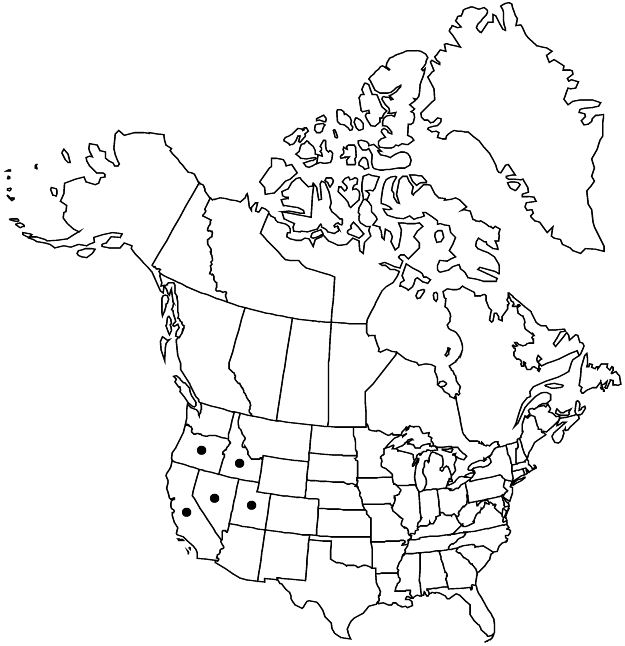Difference between revisions of "Holodiscus microphyllus var. glabrescens"
Bull. Torrey Bot. Club 70: 284. 1943.
FNA>Volume Importer |
imported>Volume Importer |
||
| (6 intermediate revisions by 2 users not shown) | |||
| Line 11: | Line 11: | ||
|label=Endemic | |label=Endemic | ||
}} | }} | ||
| − | |basionyms={{Treatment/ID/ | + | |basionyms={{Treatment/ID/Basionym |
|name=Spiraea discolor var. glabrescens | |name=Spiraea discolor var. glabrescens | ||
|authority=Greenman | |authority=Greenman | ||
| + | |rank=variety | ||
| + | |publication_title=Erythea | ||
| + | |publication_place=7: 116. 1899 | ||
}} | }} | ||
|synonyms={{Treatment/ID/Synonym | |synonyms={{Treatment/ID/Synonym | ||
|name=Holodiscus discolor var. glabrescens | |name=Holodiscus discolor var. glabrescens | ||
|authority=(Greenman) Jepson | |authority=(Greenman) Jepson | ||
| − | }}{{Treatment/ID/Synonym | + | |rank=variety |
| + | }} {{Treatment/ID/Synonym | ||
|name=H. dumosus var. glabrescens | |name=H. dumosus var. glabrescens | ||
|authority=(Greenman) C. L. Hitchcock | |authority=(Greenman) C. L. Hitchcock | ||
| − | }}{{Treatment/ID/Synonym | + | |rank=variety |
| + | }} {{Treatment/ID/Synonym | ||
|name=H. glabrescens | |name=H. glabrescens | ||
|authority=(Greenman) A. Heller | |authority=(Greenman) A. Heller | ||
| + | |rank=species | ||
}} | }} | ||
|hierarchy=Rosaceae;Rosaceae subfam. Amygdaloideae;Rosaceae tribe Spiraeeae;Holodiscus;Holodiscus microphyllus;Holodiscus microphyllus var. glabrescens | |hierarchy=Rosaceae;Rosaceae subfam. Amygdaloideae;Rosaceae tribe Spiraeeae;Holodiscus;Holodiscus microphyllus;Holodiscus microphyllus var. glabrescens | ||
| Line 39: | Line 45: | ||
|elevation=1000–3000 m | |elevation=1000–3000 m | ||
|distribution=Calif.;Idaho;Nev.;Oreg.;Utah. | |distribution=Calif.;Idaho;Nev.;Oreg.;Utah. | ||
| − | |discussion=<p>Specimens that belong to var. microphyllus are frequently misidentified as var. glabrescens when the vestiture is short and dense, such that the leaf surfaces appear to be light green or gray and insufficient magnification is used to see the trichomes. Careful examination is required and in some cases 10× magnification is insufficient due to the short, dense indumentum that occurs in some populations of var. microphyllus. Variety glabrescens is glabrous or glabrate with sessile or stipitate glands alone on the smooth green epidermis. The variety inhabits the northern Great Basin region, in areas that recently have been geologically active, or on mountains adjacent to this region that are currently or were recently tectonically active. Individual populations often comprise a small number of individuals that occupy a narrow ecologic zone on mountain peaks.</p> | + | |discussion=<p>Specimens that belong to <i></i>var.<i> microphyllus</i> are frequently misidentified as <i></i>var.<i> glabrescens</i> when the vestiture is short and dense, such that the leaf surfaces appear to be light green or gray and insufficient magnification is used to see the trichomes. Careful examination is required and in some cases 10× magnification is insufficient due to the short, dense indumentum that occurs in some populations of <i></i>var.<i> microphyllus</i>. Variety glabrescens is glabrous or glabrate with sessile or stipitate glands alone on the smooth green epidermis. The variety inhabits the northern Great Basin region, in areas that recently have been geologically active, or on mountains adjacent to this region that are currently or were recently tectonically active. Individual populations often comprise a small number of individuals that occupy a narrow ecologic zone on mountain peaks.</p> |
|tables= | |tables= | ||
|references= | |references= | ||
| Line 48: | Line 54: | ||
-->{{#Taxon: | -->{{#Taxon: | ||
name=Holodiscus microphyllus var. glabrescens | name=Holodiscus microphyllus var. glabrescens | ||
| − | |||
|authority=(Greenman) F. A. Ley | |authority=(Greenman) F. A. Ley | ||
|rank=variety | |rank=variety | ||
| Line 63: | Line 68: | ||
|publication year=1943 | |publication year=1943 | ||
|special status=Endemic | |special status=Endemic | ||
| − | |source xml=https:// | + | |source xml=https://bitbucket.org/aafc-mbb/fna-data-curation/src/2e0870ddd59836b60bcf96646a41e87ea5a5943a/coarse_grained_fna_xml/V9/V9_709.xml |
|subfamily=Rosaceae subfam. Amygdaloideae | |subfamily=Rosaceae subfam. Amygdaloideae | ||
|tribe=Rosaceae tribe Spiraeeae | |tribe=Rosaceae tribe Spiraeeae | ||
Latest revision as of 22:58, 5 November 2020
Short-shoot leaf surfaces: abaxial light green, veins, intercostal regions, and margins not obscured by hairs, glabrous or glabrate, sessile- or stipitate-glandular, without granular deposits, adaxial sparsely glabrate or glabrous, sessile-glandular, sometimes margins and veins sparsely hairy. Inflorescences 2–10 × 1–7 cm. Pedicels 1–2 mm. Flowers: nectar disc glabrous; sepals glabrous or puberulent, sessile-glandular; petal base glabrous or abaxial midvein with a few long hairs.
Phenology: Flowering May–Sep.
Habitat: Rock outcrops, talus slopes, mountaintops in alpine and subalpine habitats
Elevation: 1000–3000 m
Distribution

Calif., Idaho, Nev., Oreg., Utah.
Discussion
Specimens that belong to var. microphyllus are frequently misidentified as var. glabrescens when the vestiture is short and dense, such that the leaf surfaces appear to be light green or gray and insufficient magnification is used to see the trichomes. Careful examination is required and in some cases 10× magnification is insufficient due to the short, dense indumentum that occurs in some populations of var. microphyllus. Variety glabrescens is glabrous or glabrate with sessile or stipitate glands alone on the smooth green epidermis. The variety inhabits the northern Great Basin region, in areas that recently have been geologically active, or on mountains adjacent to this region that are currently or were recently tectonically active. Individual populations often comprise a small number of individuals that occupy a narrow ecologic zone on mountain peaks.
Selected References
None.